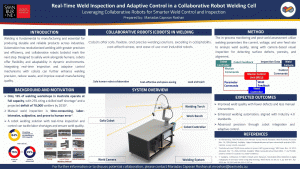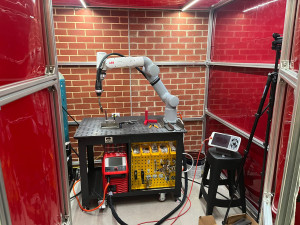Collaborative Welding with Robots using Adaptive Parameter Control
Start date: October 2025
Expected end date: October 2026
Project Overview
This project will develop an adaptive control framework for collaborative robotic welding that leverages real-time data from a MeltView welding camera, the robot controller, and the welding power source. Instead of relying on static, pre-programmed parameters, the system will continuously monitor the weld pool and arc behaviour using high-resolution video feedback, while also capturing controller data such as robot joint states, travel speed, and welding process variables (current, voltage, wire feed rate). These multimodal data streams will be processed to assess weld quality during execution, enabling the detection of irregularities such as porosity, lack of fusion, or arc instability as they occur.
To close the loop, the project will apply artificial intelligence and deep learning models that map weld pool appearance and process data to corrective control actions in real time. Parameters such as welding current, voltage, wire feed rate, robot torch speed, and orientation will be dynamically adapted to stabilise the process and maintain weld integrity. By integrating MeltView-based visual inspection with adaptive parameter control, the research will deliver a cobotic welding system capable of self-monitoring and self-correcting during operation. This approach reduces rework, improves consistency, and demonstrates the transformative potential of AI-driven adaptive welding in collaborative industrial environments.

Expected Outcomes
- Adaptive Welding Framework: A validated real-time control system that fuses MeltView camera data with robot and welding controller signals to dynamically adjust welding parameters (current, voltage, wire feed rate, travel speed, and torch orientation).
- AI/Deep Learning Models: Development of machine learning and deep learning models trained on weld pool imagery and process data to predict weld quality and recommend corrective parameter adjustments.
- Demonstrated Performance Gains: Experimental evidence of improved weld consistency, reduced rework, and the ability to adapt to variations in material, joint geometry, and process disturbances.
- Academic Outputs: Submission of at least one journal article in robotics/manufacturing and one peer-reviewed conference paper, plus contributions to ACC seminars and public engagement outputs (video demonstration, website article).
- Industry Impact: Practical demonstration to SMENCO and other interested stakeholders of how adaptive cobotic welding can improve productivity, reduce quality assurance costs, and enable more flexible deployment of collaborative robots in manufacturing.
Current Status
The project has been formally proposed and approved in principle. We are currently in the process of recruiting a Research Assistant who will work at FTE alongside the lead researcher to carry out the research. Preparatory discussions with the in-kind industry partner (SMENCO Australia) have also been initiated to confirm equipment and consumable support. The project is expected to formally commence around October once recruitment is finalised.

Supervisory Team
- Dr Mariadas Capsran Roshan – Project Lead, Swinburne University of Technology
- Professor Mats Isaksson – Program Co-Lead, Swinburne University of Technology
- Dr Michelle Dunn – Program Co-Lead, Swinburne University of Technology
- A/Prof Chris McCarthy – Chief Investigator, Swinburne University of Technology

